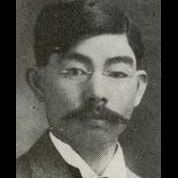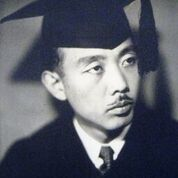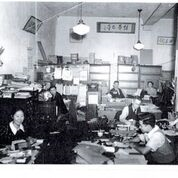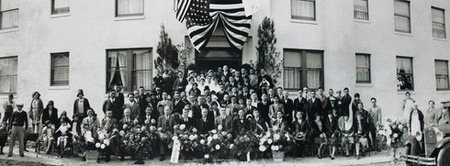In 1952, Sei Fujii, lawyer, civil rights activist, and newspaper publisher, stood before the California Supreme Court to challenge the Alien Land Law of 1913. Through skillful argument and mastery of the law, Fujii played a vital role in successfully overturning this unconstitutional law which violated the “equal protection of the laws” provisions of the 14th Amendment.
The Naturalization Act of 1870 had limited citizenship to “Free White Persons and Africans” thereby prohibiting persons of other ethnicities from becoming citizens; it was created specifically, however, in response to anti-Chinese unrest. Under California’s Alien Land Law, non-white and non-black persons were further denied the right “to acquire, possess, enjoy, use, cultivate, occupy, transfer, transmit and inherit real property, or any interests therein.” This law and subsequent revisions were passed in response to anti-Japanese hysteria spurred by the economic success of Japanese truck farmers. (To partially circumvent the Alien Land Law, first-generation Japanese farmers—the Issei—put their properties in the names of their children, the Nisei, who were citizens by birth.)
The Court’s decision was rendered in favor of Fujii on April 17, 1952. Asian immigrants could now legally own and lease land in the state of California. The significance of this decision cannot be denied.
Who was Sei Fujii and what did he do for the Japanese American Community?
Born in Yamaguchi Prefecture, Japan, in 1882, Sei Fujii was the eldest son in his family. In 1903, he immigrated to the United States to seek his future. He was an intelligent young man; his family recognized his potential and generously gave him money to pay for his passage.
Fujii graduated from USC Law School in 1911, but he was denied admission to the State Bar and a license to practice law because he was not, nor could he become, a naturalized US citizen.
After graduating, Fujii sought the assistance of a fellow USC law school graduate, J. Marion Wright (class of 1913), who could legally do what he himself could not do. Wright was the grandson of an immigrant and thus, sympathetic to the problems facing the Japanese on the West Coast. The two would partner together to serve the Japanese community for the next four decades. Fujii was determined to legally challenge the Alien Land Law, and he waited for a favorable opening in California’s social and legal climates.
Fujii provided invaluable advice to the Japanese community through his English/Japanese language newspaper, The Kashu Mainichi, and his radio program on KRKD. He advised the Issei to purchase property and own businesses in the names of their Nisei children, as a way to circumvent the restrictions of the Alien Land Law. These children were full citizens and entitled to the rights that had been denied to their parents. In this way, the Japanese community could follow the law as it was written and still experience economic gain.
Fujii later helped found the Nisei Week Festival in Little Tokyo to promote understanding and commerce between Japanese and the larger community. At the close of WWII, he organized the Japanese Chamber of Commerce of Southern California and served as its President to again promote understanding, respect, and empathy among the Japanese and non-Japanese communities.
The Japanese Hospital: US Supreme Court Decision
Fujii’s first battle, with Wright’s assistance, was to assist Japanese physicians to establish and incorporate a hospital for the Japanese American community in Boyle Heights. Japanese physicians did not have privileges at mainstream hospitals and could not admit their patients to these facilities. In 1918, the year of the great flu epidemic, this restriction had resulted in many deaths.
Creative and relentless, Fujii and Wright aided five alien Japanese physicians to file “articles of incorporation to form a corporation to lease land for a new hospital to serve the Japanese community.” First denied by the California Secretary of State, they won this two-year battle in a case entitled Jordan v. Tashiro (1928). The Japanese Hospital was built with more than $100,000 raised by the community right before the financially devastating Stock Market Crash of 1929.
Challenging the California Alien Land Law
Two landmark cases won by lawyers working with the Japanese American Citizens League (JACL) began to lay the groundwork for dismantling legalized discrimination against persons of Asian descent. In the case of Oyama v. California (1948), land that was owned and farmed by the Oyama family and held in the name of a minor son born in the US was escheated by the state. The US Supreme Court overturned a previous decision by the California Supreme Court, asserting that it was unconstitutional “to take property from Oyama’s son who was a US citizen by birth.” In another case, Takahashi v. Fish and Game Commission (1948), a denial by the California Supreme Court to issue a fishing license to a Japanese fisherman was overturned. These two outcomes opened the door for Fujii to make the final major move in revoking the Alien Land Law.
Fujii directly challenged the law and spurred a test case by purchasing a lot in Los Angeles’ Boyle Heights district and filing suit to clear title so that he could build a house there, even though he was an alien and still not permitted to become a citizen. California’s Attorney General Fred Howser attempted to stop him, and together Fujii and Wright argued their case in court, which became Fujii v. California (1952). The case went all the way to California’s Supreme Court, which ultimately struck down the Alien Land Act.
In the same year, the controversial McCarran-Walter Act of 1952 eliminated race as a basis for naturalization, making Japanese and other foreign-born Asians eligible to become American citizens for the first time.
Fujii became a naturalized US citizen in 1954. He dedicated 51 years of his life to helping the Japanese in the United States. Ironically, he became a citizen only 51 days before his death.
Posthumous Recognition
To commemorate this day, April 17, 2017, the 65th anniversary of the Fujii decision, the Little Tokyo Historical Society (LTHS) and the Japanese American Bar Association have petitioned the Supreme Court of California to declare Posthumous Admission for Sei Fujii to the State Bar. In addition, Sidney Kanazawa, a partner in the law firm of McGuire Woods, LLP and a pro bono counsel for the Little Tokyo Historical Society and the Japanese American Bar Association, has submitted a petition for Sei Fujii’s posthumous admission to the California State Bar.
* This article was originally written for the Little Tokyo Historical Society by Cindy Abrams with editorial assistance from Jeffrey Gee Chin, Fumiko Carole Fujita, Miya Iwataki, and Yukio Kawaratani. Attorneys at McGuireWoods collaborated with LTHS members Jeffrey Gee Chin and Lindsey Sugimoto who helped draft the early narrative. It has been edited for publication on Discover Nikkei.
For more information, Little Tokyo Historical Society also produced narrative short on Sei Fujii’s life entitled Lil Tokyo Reporter.
© 2017 Little Tokyo Historical Society






